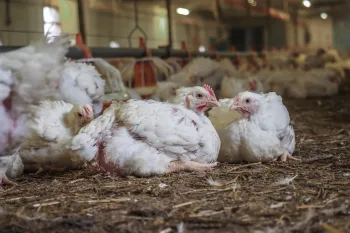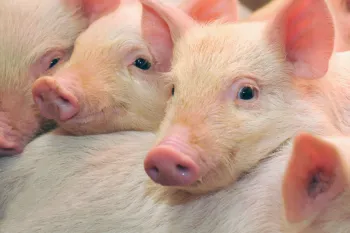WASHINGTON—Humane World for Animals, formerly called the Humane Society of the United States, has released its 2025 Food Service Industry Protein Sustainability Scorecard, an annual report evaluating leading U.S. food service providers on their efforts to improve animal welfare and reduce their environmental impact through plant-based menu changes.
The companies featured in this report manage food service operations across a wide range of settings, including K-12 schools, colleges and universities, corporate offices, sports arenas, public facilities and more. Collectively, these companies are responsible for serving tens of thousands of meals every day, giving them the unique opportunity to shape a more sustainable and humane food system.
To compile the scorecard, Humane World for Animals surveyed the largest food service companies in the country, collecting information about their sustainability commitments and the steps they’re taking to meet these goals. With a focus on transparency, goal setting and implementation strategies, the scorecard provides valuable industry insights and encourages greater accountability within the food service sector.
“It's essential that companies be open about their sustainability goals and the progress they’re making towards meeting them,” said Kate Watts, director of Food Service Innovation at Humane World for Animals. “Customers increasingly value transparency and want to understand which businesses align with their values and which do not. Our report is designed to provide a clear, fact-based view of how food service companies are turning their promises into action."
The scorecard evaluates not just companies’ public sustainability commitments but also their concrete, evidence-backed efforts to reduce food-related emissions—a major contributor to climate change. The findings reveal that while many companies tout ambitious sustainability goals, not all have demonstrated meaningful progress. In contrast, the companies earning the highest marks are the ones actively expanding plant-based menu options and reducing overall purchases of animal-based proteins—key strategies for lowering greenhouse gas emissions and reducing demand for factory-farmed animal products.
The food service companies that earned “A” grades on this year's scorecard include:
- Guckenheimer (55% plant-based menu offerings by the end of 2025 with a complementary goal to reduce animal protein purchases annually by the end of 2027).
- Metz Culinary Management (50% plant-based meals by the end of 2025 with a complementary goal to reduce animal protein purchases by 5% annually through 2027).
- Sodexo USA (33% plant-based menus by the end of 2025; 50% plant-based menus on Sodexo’s U.S. Campus segment by the end of 2025; and 50% plant-based entree recipes by 2025 at The Good Eating Company, a Sodexo food brand, while additionally tracking animal protein purchase reductions annually).
- HHS, LLC. (50% plant-based retail dining menus by the end of 2027 and a complementary goal to reduce animal protein purchases by 25% by 2027).
- Fresh Ideas (50% plant-based menu entrees by the end of 2025, with a complementary goal to also reduce animal protein purchases annually through 2025).
- Elior North America (50% plant-based entrees in new food programs and promotion developments by the end of 2025; 30% plant-based entrees by the end of 2025 for the residential dining menus in its higher education segment; 30% plant-based entrees by the end of 2025 for retail dining menus in its healthcare segment; and 30% plant-based entrees by the end of 2025 in its professional dining segment).
Karla Dumas, a registered dietitian nutritionist and vice president of Farm Animal Protection at Humane World for Animals, emphasized the importance of clarity and accountability when it comes to corporate commitments.
“Consumers are increasingly discerning, and they no longer accept empty promises,” Dumas said. “In an era where greenwashing is all too common, honesty around sustainability is paramount—food companies must show, not just tell, how they are making a positive impact on animals, the environment and society."
The global food system is responsible for roughly one-third of all human-caused greenhouse gas emissions. Animal agriculture, in particular, is a major driver of climate change—requiring significantly more land, water and energy than plant-based food production. Transitioning toward more plant-based offerings and cutting down on the use of animal proteins allows companies to reduce their carbon footprint and support a more resilient, humane global food system.



